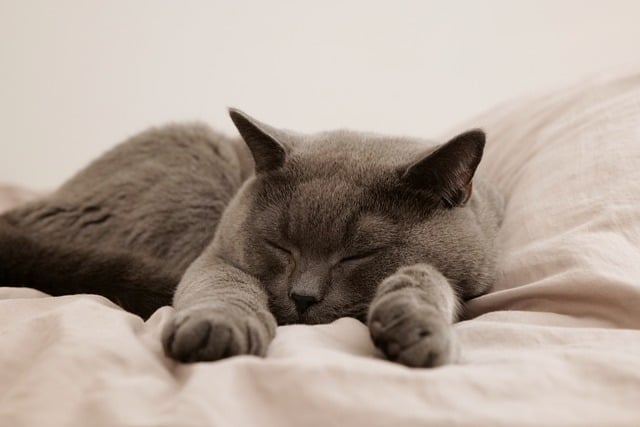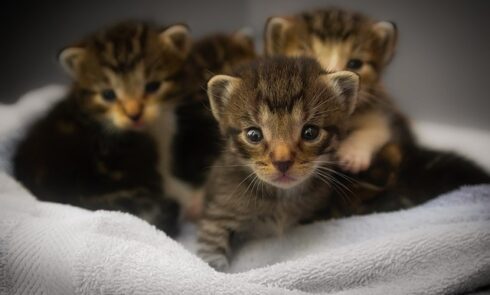The inexplicable slumbering habits of cats, often nestled in locations that bewilder their human companions, are well-documented. Despite the known affinity for sleep your feline comrade harbors, pinpointing the exact spot they deem utmost comfortable remains an elusive task to humans. A preferred choice appears to be the bed of their two-legged friend – a sanctuary promising both snug comfort and reassuring safety.
By scrutinizing where upon your resting place your cat decides to doze off might shed light on certain nuances of its behavior. Each particular position holds different connotations within the labyrinthine realm of feline decision-making processes. Opting for a sleeping location close to your cranium could denote a yearning for security, whilst winding up near your extremities might hint at respect towards personal boundaries. Deciphering these subtle pointers acts as an interpretive lens into what sharing such intimate proximity signifies from a feline perspective.
Therefore, it becomes essential for those who have accepted the responsibility of nurturing these mysterious creatures — us cat owners — to familiarize ourselves with such eccentric preferences so as better accommodate our enigmatic friends’ caprices.
The Science Behind Cats’ Sleeping Patterns
Shrouded in the veil of antiquity, cats have been our companions, fascinating us with their unique behavioral quirks. One such intriguing eccentricity is their whimsical sleep schedule – a trait deeply embedded in their crepuscular nature that dictates periods of activity during twilight hours of dawn and dusk. This nocturnal dance between slumber and vigilance was originally choreographed by nature to align with the hunting patterns of their ancient counterparts when prey were most active. As time passed, domesticated felines learned to weave this rhythm into human routines, intertwining their sleep cycles with those of their owners.
The selection process behind your cat’s preferred sleeping spot carries significant weight as well. It can serve as an illuminating indicator or “litmus test” revealing the depth of comfort and trust it feels within its surroundings – a silent testament to its sense security. For example, should you find your feline companion napping openly without fear or reserve; it translates as a powerful signifier that they feel completely safe within that particular space. The chosen spot might also be reflective of its bond with you: if your cat opts for snuggling up close at night, it implies a deep-rooted trust and emotional connection; on the other hand, more solitary cats may seek out private corners reflecting an independent disposition.
It’s important not to overlook these subtle hints: remember each feline has its own individual preferences which define its comfort zone.
Interpreting Your Feline’s Choice of Sleeping Spot

Inhabiting our domestic spheres, our feline companions exhibit a nimble and adaptable rhythm of repose. It could be posited that the secret to deciphering your cat’s persona is ensconced in its chosen slumber locations. Pondering over queries such as “What implications does it carry when your cat sleeps next to you?” can provide illuminating insights into the intricate tapestry of your cat’s psyche. This behavior isn’t just about mere comfort – it reflects an assortment of factors like secure surroundings, health condition, social connection and thermal contentment that influence this choice by your kitty companion.
Your furry friend choosing to snooze beside you signifies trust and affection, adding an intriguing layer to their behavioral pattern. The forefathers of contemporary cats were solitary hunters; this fact underscores the importance of this act. By deciding to sleep next to you, they are effectively lowering their defenses and exposing themselves – a profound vulnerability both on physical safety front and emotional wellness spectrum; their trust embodied in this decision is implicit yet potent. Thusly answering the enigmatic question: “What does it mean when your cat sleeps next to you?”, primarily revolves around themes such as trust, bonding and emotional wellbeing.
Decoding the Feline Behavior of Bed-Sharing
In the realm of feline conduct, particularly regarding cohabitation in slumbering spaces, it’s not unusual for those blessed with cat companionship to ponder: “What is the underlying meaning when your little furball chooses to nap atop your belongings?” In response, animal behaviorists decipher this curious habit as a significant emblem of affection and trust. The act of a cat selecting your possessions (most notably those imbued with your unique scent) as their preferred place for sleep sends an undeniable message that they feel secure and at ease in your company. Your familiar odor provides solace and comfort to them, often spurring them on their quest to locate items bearing your scent when it’s time for some shut-eye.
Further delineating this intriguing behavior pattern, one might find it also suggests an innate longing for warmth and camaraderie. Cats are notoriously discerning selectors of sleeping quarters—often opting for areas radiating heat such as sunlit window ledges or snug niches within your bedspread. Likewise, if you notice that these tiny creatures routinely settle down on top of personal items like clothing or bedding—or even technological devices like laptops—it represents their distinct method of seeking comfort through warmth while maintaining a connection with you in periods where human presence isn’t available.
Health Implications of Sharing Your Bed with Your Cat
Your bed’s co-occupancy with your cat might be enveloped in a cozy charm, nurturing feelings of camaraderie and warmth. Still, it is crucial to untangle the potential health repercussions woven into this endearing habit. A morning serenaded by soft purring can indeed have therapeutic effects; however, certain ailments may surreptitiously hitch a ride from your feline companion during these close encounters.
Frequently echoed among the corridors of feline parenthood is the question: ‘Why does my cat choose to sleep at the foot of my bed?’ This behavior could be interpreted as an expression of affection or simply represent an oasis of comfort for them. Yet, one cannot turn a blind eye to its possible medical implications for you, their human counterpart. Cats often serve as unwitting carriers of allergens nestled within their fur, capable of triggering sneaky allergic reactions in humans. Add to this mix disease-spreading parasites such as fleas and mites that tend to hobnob with our furry friends – they can easily find passage onto your sheets and potentially incite skin irritations or infections.
Therefore, examining these behaviors’ health ramifications becomes critical in maintaining a bedroom environment conducive not just for you but also for your cherished feline partner.
Analyzing the Emotional Bond Between Cats and Owners
In the convoluted scheme of human-animal connections, the emotional tethering between cats and their humans frequently emerges as a topic fraught with fascination. Central to this bond is the recognition that cats, unlike their dog counterparts, communicate love in subtly layered manners, forging an unparalleled relationship with their humans. It’s common for our feline friends to display actions symbolic of profound trust and affection such as purring, nuzzling or maintaining intense eye contact—these are signs indicating a deep emotional connectivity that’s undeniably profound.
To elaborate more intricately, an important facet of this cat-human connection often reveals itself through a cat’s tendency to favor its owner’s company during extended sleep periods. Dispelling widespread misconceptions, cats aren’t distant beings but instead often yearn for companionship along with safety and comfort found within the proximity of their cherished humans. As such when your feline pets opt to share your sleeping space it signifies not just physical closeness but also reflects how they understand and reciprocate the deep-seated emotional tethering between you two; thereby actively contributing towards fostering this captivating interplay of faithfulness and affection.
The Psychological Impact of Cats Sleeping on Beds
For a myriad of individuals, the act of bequeathing their nocturnal sanctuary to an endearing feline friend acts as a conduit for mitigating emotional unrest and tension. The mere existence of a cat sharing one’s sleeping quarters can instill an aura of solace and fortification that remarkably enhances their psychological equilibrium. It is not unusual for those who nurture pets to recount experiencing profound tranquility and repose when their furry companion forms a cozy ball beside them.
On the contrary, scholars in psychology underscore how such behavioral patterns might mold emotional reliance on our four-legged friends while struggling with mood irregularities. There lies utmost importance in fostering an evenly balanced bond that advances the mental welfare of both parties involved – the pet nurturer and the nurtured pet alike. While leaning on your cat confidante for mental sustenance proves advantageous, uncontrolled dependency could potentially pave way towards complications like separation anxiety during times when your beloved creature isn’t around.
FAQ
Cats, with their distinct sleeping rituals, are renowned for their propensity to sleep anywhere from 13 to 14 hours a day. Their preferred spots are typically warm, tranquil and secure locations, yet they exhibit an intriguing habit of altering these locations quite often.
Being crepuscular creatures by nature means cats come alive during dawn and dusk. This particular pattern of sleep is intrinsically tied to their predatory instincts. Intriguingly enough, cats remain in light sleep for most part of this time – ever vigilant against possible threats or hunting chances that might present themselves.
Felines may find your bed appealing as a spot for rest due to diverse reasons such as comfort, warmth and safety along with providing them opportunity for bonding. Beds usually provide them an advantageous point from which they can keep an eye on surroundings while taking solace in your presence which brings about feelings of security.
Should your furry friend choose your shared space as its resting place – take it as a signifier of trust and affection. Given that cats are territorial beings at heart; sharing space indicates deep-seated bond between both parties involved.
Generally speaking, sharing one’s bed with a pet cat doesn’t pose much danger but certain risks like allergies or disturbances related to nocturnal awakening patterns do exist along with potential disease transmission risk – hence maintaining good hygiene practices and regular vet visits ensure safe cohabitation environment
Certainly! By sharing a sleeping area, the emotional ties between you and your feline companion can be significantly strengthened. This gesture of trust, comfort, and affection is quite meaningful. However, it’s crucial to respect their choices and not impose this behavior.
The psychological impacts can swing widely from individual to individual. For some people, it may bring about feelings of companionship and stress relief whereas for others it could lead to disrupted sleep patterns. Therefore finding a balance that suits both parties involved – you as well as your cat – is vital.


